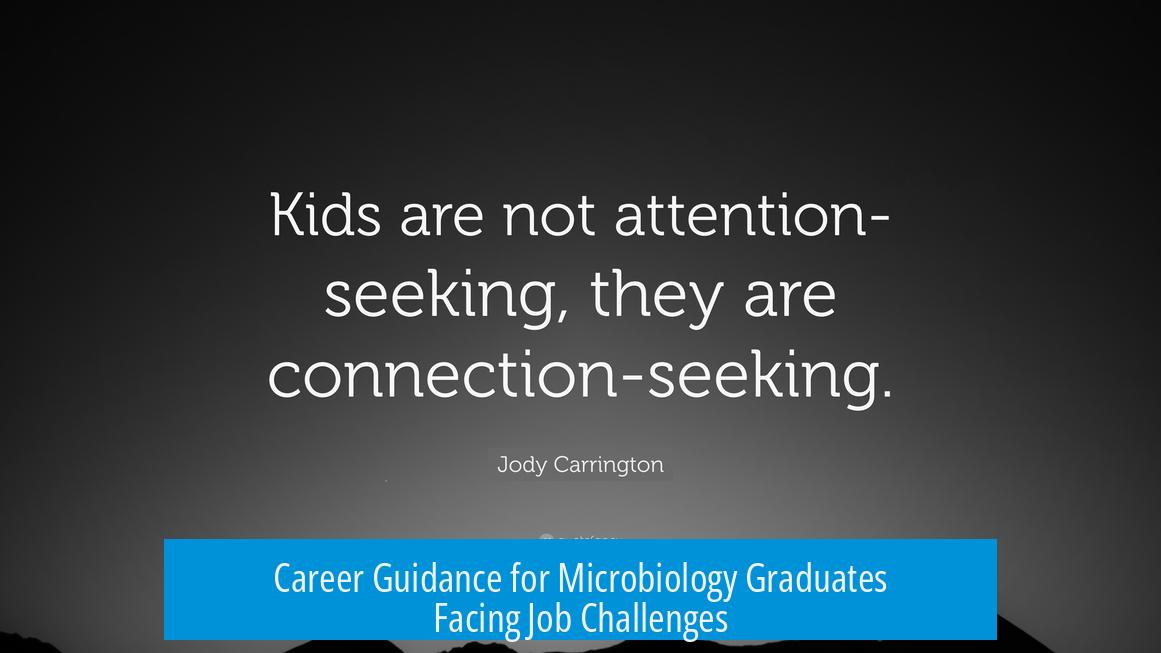Seeking Career Advice: Microbiology Graduate Struggling with Job Opportunities

Microbiology graduates can access various career paths, especially within pharma, clinical labs, and healthcare sectors. This article highlights practical job opportunities, career routes, and advancement strategies tailored to those with microbiology backgrounds who face challenges in securing employment.
Pharmaceutical Industry Opportunities

The pharmaceutical sector offers entry-level jobs for microbiology graduates, particularly in quality control (QC) and analytical microbiology roles. Positions like “QC Microbiology Analyst,” “Microbiology Scientist 1,” “Associate Scientist,” and “Research Associate” frequently appear on job boards.
Typical responsibilities include conducting endotoxin and bioburden testing, preparing detailed reports, and ensuring compliance with regulatory standards. These roles provide valuable experience and exposure to pharmaceutical manufacturing processes.

Medical Laboratory Technology (Clinical Lab Science) Careers
The clinical lab science field offers distinct career paths: technician and specialist roles. Technician positions usually require a two-year certification and involve routine lab work but often come with lower pay and less favorable work conditions.

Graduates with a bachelor’s or master’s degree in microbiology and possession of a Medical Laboratory Scientist (MLS) certification enjoy better salaries and improved work environments compared to Medical Laboratory Technician (MLT) roles. This path involves clinical diagnostics and more specialized responsibilities.
Clinical Microbiology Career Path in the UK

For those based in the UK, the National Health Service (NHS) provides a structured training pathway for clinical microbiologists through the Scientist Training Programme (STP). This is a 3-year paid training scheme leading to a fully qualified clinical microbiologist status.
Upon completion, professionals can pursue Higher Specialist Scientist Training (HSST) to obtain a Doctorate in Clinical Science (DClinSci) and potentially work as consultants within the NHS or internationally.

Networking and Professional Development Resources
Microbiology graduates benefit from engaging with career and professional development platforms designed for microbial science students, researchers, and practitioners. These resources offer job listings, mentorship options, and networking events connecting like-minded professionals.
Strategies for Career Advancement
- Build relevant laboratory and analytical skills focusing on industry standards.
- Obtain certifications such as MLS or STP training, depending on location.
- Engage in internships or research projects to gain practical experience.
- Join professional microbiology societies to expand networks.
- Stay updated on emerging technologies and protocols in microbiology.
Key Takeaways
- Pharma industry offers multiple entry-level roles in QC and analytical microbiology.
- MLS certification improves job prospects and work conditions better than MLT roles.
- UK-based clinical microbiologists can train via NHS STP for advanced clinical roles.
- Professional development and networking enhance career opportunities.
- Continuous skill-building aligned with industry demands supports career growth.
Seeking Career Advice: Microbiology Graduate Struggling with Job Opportunities
For a microbiology graduate struggling to find footing in the job market, the answer often lies in targeting specific sectors like the pharmaceutical industry, medical laboratory technology, or clinical microbiology careers—each offering distinct pathways and challenges. Let’s break down these routes and see how you can turn your degree into a launching pad for a rewarding career.
Finishing a bachelor’s or master’s in microbiology feels like holding a golden ticket. But the job hunt? That’s a different story. It can feel like tossing your résumé into a black hole full of “no response” echoes. So, where should you look, and what should you expect?
Pharmaceutical Industry: Your Degree’s Frontline
Believe it or not, your microbiology expertise is exactly what the pharmaceutical world needs. Entry-level roles such as QC Microbiology Analyst or Microbiology Scientist I regularly pop up on job boards. These are your bread and butter starting points, under titles like “Associate Scientist” or “Research Associate.” Yes, the names might sound humble, but they lead to great careers.
Typical responsibilities in these roles involve endotoxin and bioburden testing—you’ll be hunting microscopic troublemakers that can spoil products or harm patients. You’ll also write reports and documentation, which sounds tedious but is vital for regulatory clarity and product safety.
This arena offers a crystal-clear advantage: plenty of positions are regularly opened, and they value your degree highly. It’s a gateway to career growth and specialization.
Considering Medical Laboratory Technology?
Here’s a real-talk moment: technician jobs in Medical Lab Technology (MLT) sound cool—the promise of a hands-on role in diagnostics is appealing. But remember, those 2-year technician positions tend to come with lower pay and tougher working conditions.
However, don’t let that discourage you. With a bachelor’s or master’s in microbiology and an MLS (Medical Laboratory Scientist) certification—not just an MLT—you gain access to better salaries and much-improved work environments.
Think of the MLS credential as an express pass to more respect and opportunity within clinical labs. If hands-on diagnostics excite you but you want more stability and pay, this path is worthy of serious thought.
Pathway to Clinical Microbiology in the UK
For those reading from the UK: the NHS offers an intriguing opportunity through the Scientist Training Programme (STP). It’s a three-year paid apprenticeship of sorts. You work and learn simultaneously to become a fully qualified clinical microbiologist.
Post-STP, there’s even an Advanced Level Scientist Training Programme (HSST) that can propel you toward a Doctorate in Clinical Science (DClinSci). Achieving this sets you up as a consultant microbiologist—a respected and influential role both in the UK and internationally.
This structured training route is gold for UK-based grads but requires dedication, competitive application, and a clear vision of clinical microbiology as a career.
Unlocking Resources and Strategies for Microbiology Graduates
Feeling overwhelmed? Understandable. Many grads are. But professional growth comes from using the right resources and making meaningful connections. Industry associations and microbiology societies often host career development resources, including networking events, mentorship programs, and job boards.
Want a practical tip? Join online forums or groups where working microbiologists discuss daily challenges, job openings, and career advice. Perspective from those in the trenches can sharply alter your strategy.
So, What’s the Game Plan?
- Define Your Target Sector: Is it pharma, clinical labs, or maybe research? Knowing this helps tailor your applications.
- Enhance Certifications: If you’re considering clinical lab roles, MLS certification beats technician-level credentials.
- Apply Strategically: Hunt for entry-level roles like Associate Scientist or Research Associate that welcome fresh grads.
- Network Relentlessly: Use professional groups, LinkedIn, and industry gatherings to meet people who can open doors.
- Consider Geographic Opportunities: If UK-based, NHS training programs are fantastic for clinical microbiology careers.
Remember, career progression doesn’t happen overnight. Sometimes you have to start in roles that feel less glamorous, gaining experience and proving your skills. Endotoxin testing might not be the thrill ride you imagined, but it’s essential work that builds your profile.
Final Thoughts: Why Persistence Pays Off
Job hunting can be a grind, with moments where you question your worth. But remember that microbiology is a broad and essential field with many avenues. Your degree is versatile—quality control, research, diagnostics, clinical work—the list goes on.
Are you ready to pivot and explore new certifications or training programs? Could freelance or contract roles in labs or pharma firms be your entry point? And how about volunteering in research settings to gain experience?
Your story as a microbiology graduate struggling with jobs isn’t uncommon, but it’s also not the end of your journey. The key lies in persistence, strategic choices, and tapping into the right resources. Keep pushing. Your microbe-fighting career awaits.
“The door to opportunity opens widest for those who keep knocking—sometimes with a pipette in hand.”
What entry-level jobs can a microbiology graduate find in the pharmaceutical industry?
Positions like QC Microbiology Analyst, Associate Scientist, and Research Associate are common entry points. Tasks often include endotoxin testing, bioburden analysis, and report writing.
How does a career in Medical Laboratory Technology differ between technician and specialist roles?
Technician roles last about two years and offer lower pay with tougher work conditions. Specialist roles require a bachelor’s or master’s and a Medical Lab Scientist certification, giving better pay and work conditions.
What is the pathway to become a clinical microbiologist in the UK?
Apply for the NHS Scientist Training Programme (STP). It includes three years of paid training. Afterward, you can pursue higher training to become a clinical scientist consultant.
What resources are available for microbiologists seeking career growth?
Resources include job listings, networking opportunities, and professional development tools aimed at students, researchers, and practitioners.
What strategies help microbiologists advance professionally?
Focus on specialized skills relevant to your field. Gain certifications, seek mentorship, and stay updated on industry trends to improve job prospects and career growth.





Leave a Comment